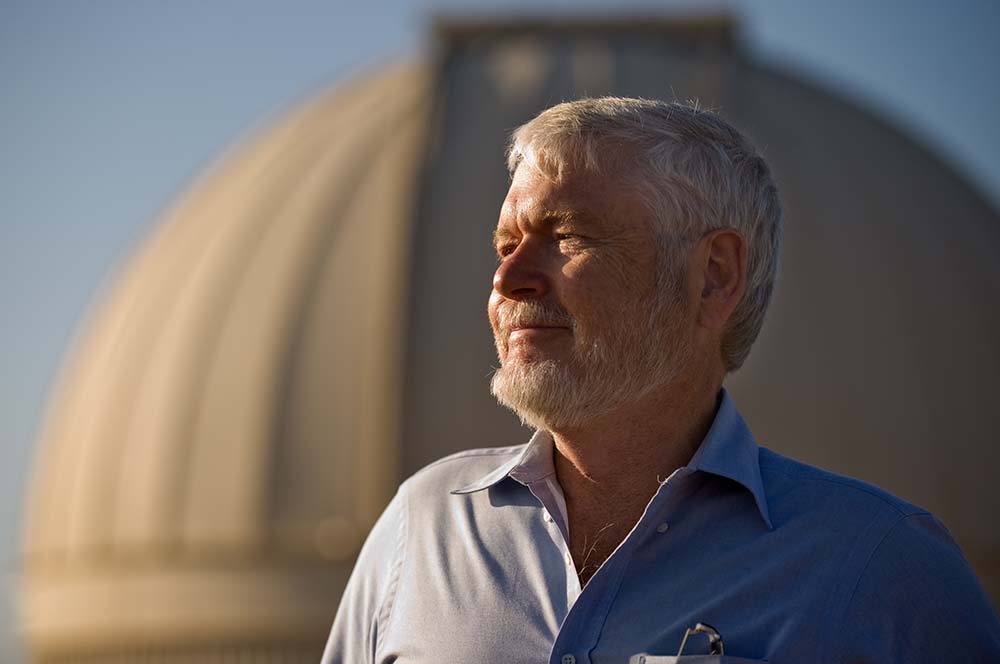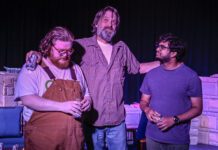The dual successes of one of America’s most renowned astrophysicists and science fiction writers are due, in part, to his undergraduate days at the University of Oklahoma.
Gregory Benford, who graduated Phi Beta Kappa from OU in 1963 with a bachelor’s degree in physics, credits his time in Oklahoma for honing his writing and launching a career that has explored cosmic plasma and theoretical tachyons.
“The physics education we got at OU was quite fine,” he says. “I liked OU and living there, even the boarding house where we stayed. I remember a food fight once between psychology majors.”
Benford and his identical twin, Jim, both got full rides to OU, where they expanded the scope of Void, a “fanzine” they began in 1954 as 13-year-olds.
“Editing Void really focused my writing,” Benford says. “That helped enormously during those years.”

While he earned master’s and doctoral degrees at the University of California, San Diego, Benford had his first science fiction stories professionally published. His 1980 novel, Timescape, won the prestigious Nebula, British Science Fiction and John W. Campbell Memorial awards.
Gordon Bernstein, one of the main characters in Timescape, struggles with the politics of academia. Benford says he modeled those frustrations on his OU experiences.
“I started going to colloquia to see what was happening with the professors,” says Benford, who saw the machinations and favoritism common in higher education. “Fortunately for me, I learned to read the papers of the speakers before each colloquium and moved toward the front of the room. All these professors would turn around and listen to my questions and that impressed them.”
Benford says his two greatest accomplishments in physics have been the introduction of the idea that jets emanating from black holes have magnetic fields – proved true over time – and an oft-cited paper that he wrote with world-famous physicist Edward Teller on tachyons (hypothetical particles traveling faster than the speed of light).
He has received scores of plaudits for his research, theories and essays. That’s why he is a staunch advocate for what is called hard science fiction, which keeps science at the forefront of the story, along with plot and character development.
“It’s speculative fiction focusing on the methods and results of science, especially in the future,” Benford says. “Hard science fiction writers deal with the hows, the what-ifs and cultural implications of science.”
For instance, Benford is passionate about climate change – both as a physicist and writer.
“Science and technology have been the greatest drivers of Western civilization for centuries,” he says. “As a result, we have less time to deal with the results, such as climate change. The world moves slowly and has a slow inertia, but humans are a fast-moving species. We have to deal with climate change now.”
Benford’s latest novel, Rewrite: Loops in the Timescape (a thematic sequel to Timescape), was released in January. He and Larry Niven should see Glorious, the final part of a trilogy with Bowl of Heaven and Shipstar, published in March.
“Time and again,” he says, “I learn something in science and then write a story about it. Science fiction is just a cultural response to science.”
Following are additional questions for and answers from physicist and science-fiction author Gregory Benford, who is also an adviser to NASA and the Mars Society.
Oklahoma Magazine: How did a guy from Mobile, Alabama, wind up at the University of Oklahoma?
Gregory Benford: My brother, Jim, and I went to OU because our father commanded the National Guard in Dallas. He had been commandant at Fort Sill, so I was familiar with Oklahoma. Our parents wanted us to stay nearby and OU gave both of us four-year scholarships.
OM: What is your assessment of today’s science fiction and where the genre is headed?
GB: It’s splattered all over the place. There are so many sub-rivulets – young adult, dystopias, space operas. Dystopias are pretty easy to write because they point out problems instead of solve them. Science fiction should be forward-thinking because it solves problems.
OM: What are you exploring in astrophysics now?
GB: Asteroids. These are artifacts, 10 times farther away than the moon, and they could easily hold signs of life because they are relatively easily to land on and affix to. My brother and I are working on detecting so-called lurkers, which are possible search craft sent by intelligent beings. They might be anchored on places, such as asteroids, near Earth.
OM: What do you see as the next biggest discoveries in astrophysics?
GB: There’s a plethora of data from gravitational wave detectors that will open up knowledge. The LIGO [laser interferometer gravitational-wave observatory] at Cal Tech has thrown open a new window on the universe.
OM: What else are you doing?
GB: I’ve started a genetics company to produce a rebuilder of genes that can be used with Alzheimer’s patients. It’s a direct application of science to a human problem.
OM: Why are you still so active?
GB: I’ve always learned by following my nose. I’m an astrophysicist who never took classes in astrophysics. I took classes in quantum mechanics, but my career led me into astrophysics. There’s no worse thing in a career than being bored.


























